Unit 9 Can you come to my party Section A Grammar Focus-3c 课件(共29张PPT)人教版英语八年级上册
文档属性
| 名称 | Unit 9 Can you come to my party Section A Grammar Focus-3c 课件(共29张PPT)人教版英语八年级上册 | 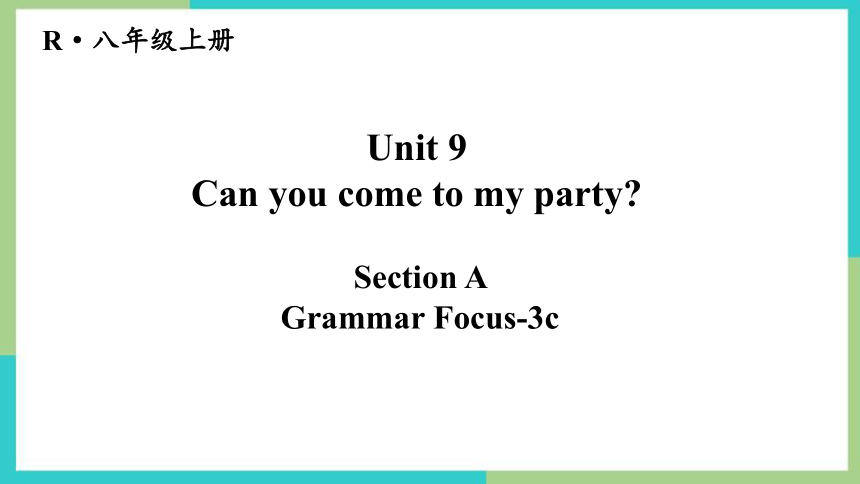 | |
| 格式 | pptx | ||
| 文件大小 | 5.5MB | ||
| 资源类型 | 教案 | ||
| 版本资源 | 人教新目标(Go for it)版 | ||
| 科目 | 英语 | ||
| 更新时间 | 2024-01-02 21:51:01 | ||
图片预览


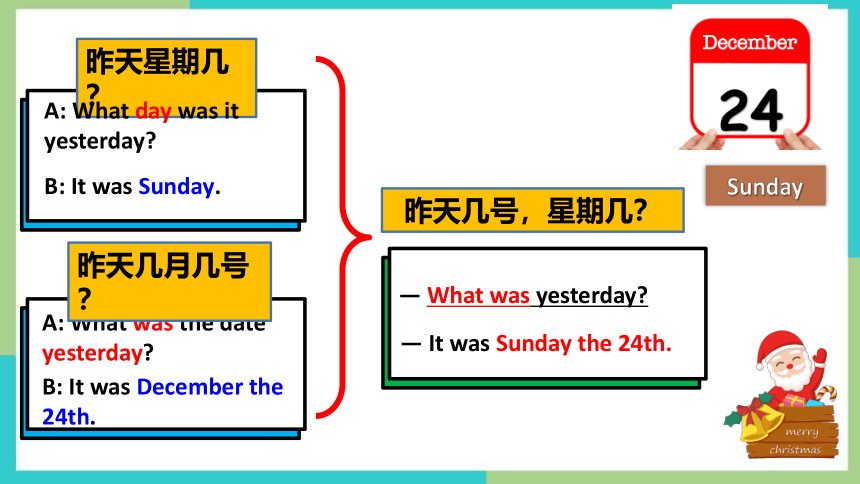
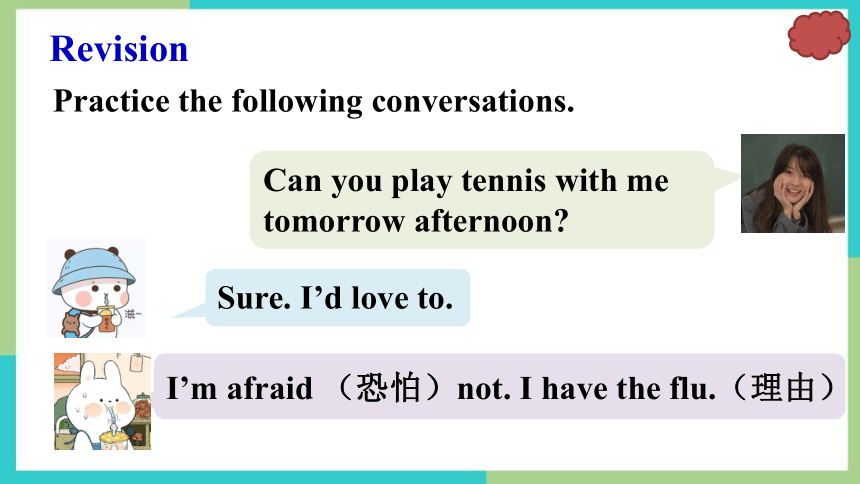
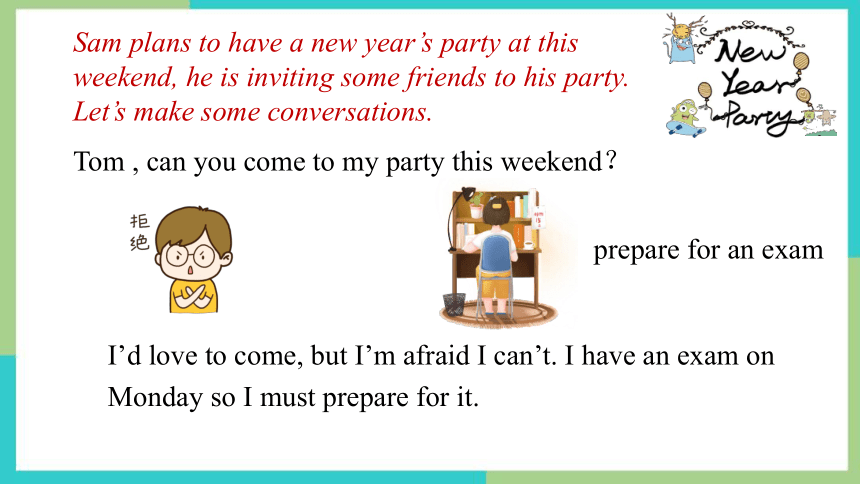
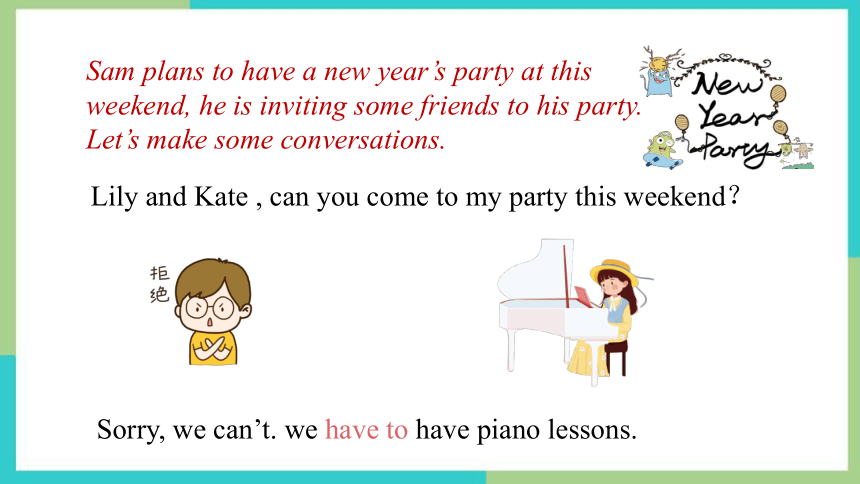
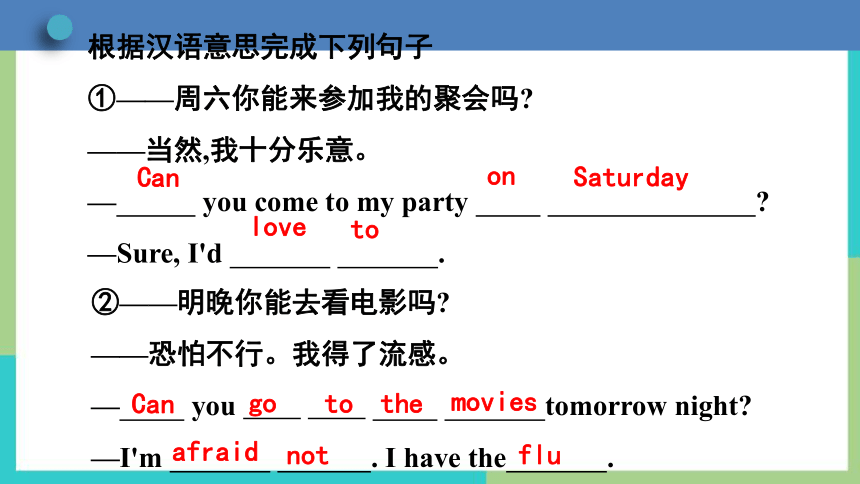

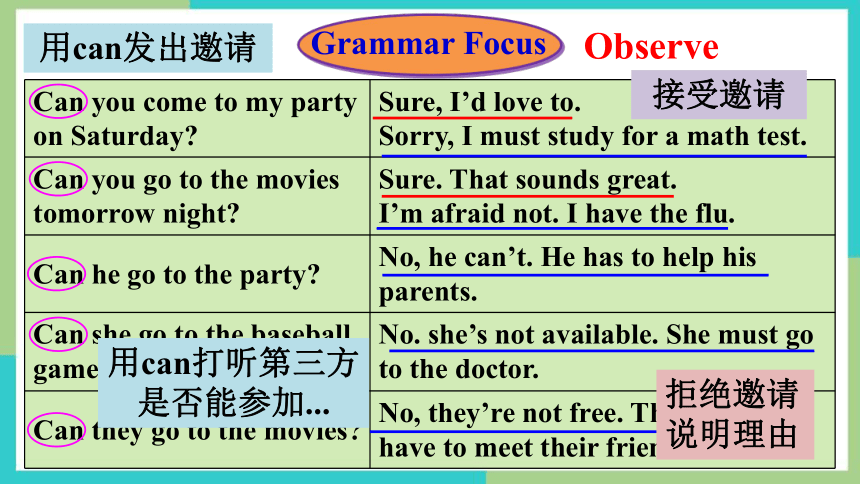
文档简介
(共29张PPT)
Unit 9
Can you come to my party
R·八年级上册
Section A
Grammar Focus-3c
1.记住并会正确使用本课时的重点单词、短语和句型:accept、 refuse、 invite; Can you/he/she come to... Can you/he/she go to... Sure, I'd love to. Sorry, I must...
2.能用课本Grammar Focus部分表格中的句子发出邀请,并能礼貌地接受邀请及委婉地拒绝邀请。
3.学会合理安排日常活动并能做出相应的计划。
A: What was the date yesterday
昨天星期几?
昨天几月几号?
A: What day was it yesterday
B: It was December the 24th.
B: It was Sunday.
昨天几号,星期几?
— What was yesterday
— It was Sunday the 24th.
Sunday
24
Revision
Practice the following conversations.
Can you play tennis with me tomorrow afternoon
Sure. I’d love to.
I’m afraid (恐怕)not. I have the flu.(理由)
Tom , can you come to my party this weekend?
I’d love to come, but I’m afraid I can’t. I have an exam on Monday so I must prepare for it.
Sam plans to have a new year’s party at this weekend, he is inviting some friends to his party. Let’s make some conversations.
prepare for an exam
Lily and Kate , can you come to my party this weekend?
Sorry, we can’t. we have to have piano lessons.
Sam plans to have a new year’s party at this weekend, he is inviting some friends to his party. Let’s make some conversations.
根据汉语意思完成下列句子
①——周六你能来参加我的聚会吗
——当然,我十分乐意。
— you come to my party
—Sure, I'd .
Can
to
love
Saturday
on
②——明晚你能去看电影吗
——恐怕不行。我得了流感。
— you tomorrow night
—I'm . I have the .
Can
flu
not
afraid
movies
the
to
go
③——他能参加棒球比赛吗
——不,他没空。他必须去看医生。
— he go to the
—No, he isn't .
He go to the .
Can
available
game
baseball
doctor
must
④——他们能去看电影吗
——不。他们可能不得不去见朋友。
—Can they go to the movies
—No. They might their friends.
have
to
meet
Can you come to my party on Saturday Sure, I’d love to.
Sorry, I must study for a math test.
Can you go to the movies tomorrow night Sure. That sounds great.
I’m afraid not. I have the flu.
Can he go to the party No, he can’t. He has to help his parents.
Can she go to the baseball game No. she’s not available. She must go to the doctor.
Can they go to the movies No, they’re not free. They might have to meet their friends.
Grammar Focus
Observe
用can发出邀请
用can打听第三方是否能参加...
接受邀请
拒绝邀请
说明理由
●表达邀请及回答的总结:
1.表示邀请的句子:Can you come/go to... /Would you like to... /...
2.接收邀请的回答:Sure, I'd love to. / Sure, that sounds great./Yes, I'd love to./Of course./OK./Certainly./...
3.拒绝邀请的回答:Sorry, I must ... / No, I have to… / No, I'm available. /I'm afraid not. I have the flu. /...
情态动词 can 有一定的词义,但不能独立存在,它必须与动词原形一起构成谓语。
情态动词 can 没有人称和数的变化, 否定形式是can’t, 过去式是could。
1. can表示做某事的能力时, 对以它开
头的一般疑问句作肯定回答用“Yes, 主语 +can.”; 作否定回答用“No, 主语 + can’t.”
情态动词 can 的基本用法
I can speak English.
--Can you speak English
--Yes, I can.
--No, I can’t.
2. can表示请求、 允许做某事时, 对于以它
开头的一般疑问句:
作肯定回答:Sure, I’d love to.
作否定回答:Sorry, I can’t. / I’m afraid not.
/ I’d love to, but …
— Can you come to my house next Monday
— Sure, I’d love to.
— Can you go shopping with me this weekend
— Sorry, I have to practice the violin.
◎学法指导:1.3a各个空白处选择哪个短语填空,不仅仅依据句子意思,还要判断短语的词性特点。2.弄清3b中几个单词的意思:Inviting “邀请”、Accepting“接受(邀请)”、Refusing“拒绝(邀请)”、Reason“原因”。
1.阅读课本3a对话可知:
对话1中的might是情态动词,故其后必须是动词原形;对话3问的是时间,故答句里面须有时间信息;根据对话4的疑问词who,可知回答的是人。
2.根据以上分析,完成3a任务,同伴之间分享答案, 并与同伴操练3a对话。
3.完成3b填空,与同伴分享答案。
3a
Complete the answers with might and one of the phrases in the box.
watch TV
on the weekend
my cousin
visit my grandparents
practice the violin
1. A: What are you going to do on
Saturday
B: I’m not sure. I might
_____________________
2. A: What are you planning to do
after school
B: I don’t know.
_____________________
visit my grandparents.
I might watch TV.
might 情态动词,表示可能性,用于推测。
Let’s compare.
She received his present, but she didn't accept it.
So she refused it right away.
accept “(主观上愿意)接受”
receive “收到”客观上收到或拿到
refuse “拒绝”
refuse to do sth.
拒绝做某事
She refused to accept his present right away.
3. A: When will you finish the science homework
B:________________________________________
4. A: Who are you going to the movies with
B:____________________________________
5. A: Are you free to come to my place on Saturday
B: _______________________________________
I don’t know. I might finish it on the weekend.
I’m not sure. I might go with my cousin.
I’m not sure. I might have to practice the violin.
3b
Complete the sentences below. Use the words in brackets to help you.
1. Inviting:_____________________________(can/play tennis)
Accepting:________________________________
2. Inviting:_______________________________________
(would like to/go to the movies)
Refusing:________________________________
Reason:__________________________________
(might have to)
Can you play tennis on Saturday
Sure. That sounds great.
Would you like to go to the movies on Friday
Sorry, I can’t.
I might have to go out with my parents.
3. Inviting: __________________________________
(can/hang out with us tonight)
Refusing: _________________________________
Reason: __________________________________(must)
4. Inviting: __________________________________
__________________________________
(would like to / come to my birthday party)
Accepting:________________________________
Can you hang out with us tonight
Would you like to come to my birthday
party
Sorry, I’m not free.
Sure, I’d love to.
I must study for a test.
Presentation
Write down everything you have to do next week. Choose a day and time to have a party. Then invite classmates to your party.
3c
A: Can you come to my party
B: When is it
A: Next week, on Thursday night.
B: I’m sorry. I have to study for a math test.
MON.
TUE.
WED.
THUR.
FRI.
SAT.
SUN.
go to the movies at night
visit my grandpa in the afternoon
look after my sister in the evening
prepare for the chess game at night
study for a test all day
◎用法总结:I'd love/like to=I would love/like to, 意为“我很乐意去。”, would like后跟动词不定式,to不可省略。如:
I would like to go to the movies.我想去看电影。
—Would you like to go shopping with me 你想和我去看电影吗
—Yes, I'd love/like to. 是的,我想去。
Sure, I'd love to. 当然,我很乐意。
按要求完成下列各题。
1.——你想和我去钓鱼吗 (翻译)
——是的,我想去。
—
—
Would you like/love to go fishing with me
Yes, I'd love/like to.
2.我想去打篮球。(翻译
I'd like/love to play basketball. /I want to play basketball.
◎用法总结:二者都表达“必须”之意。have to 表示客观上的需要,它和实义动词一样有人称、数和时态的变化,否定形式有don't/doesn't/didn't have to;must 表示主观上的要求,无人称和时态的变化,否定形式mustn't,表示“禁止;不准”。否定回答一般用 needn't 或don't have to 表示“不必……”。如:
have to 与 must的用法
We have to wear cool clothes in summer. 在夏天我们不得不穿上凉快的衣服。(客观要求)
I must learn English well.我们必须学好英语。 (主观需要)
按要求补全下列句子。
—Must I go now
—Yes, you .(肯定回答)/
No, you .(否定回答)
must
needn't/don't have to
Are you free to come to my place on Saturday 星期六你有空来我家吗
◎用法总结:be free to do sth.意为 “有空做某事;自由地做某事”。如:
On weekends, I'm free to read my favorite books.周末,我有时间读自己最爱的书。
Look at the nice fish! They are free to swim in the pool.看那些漂亮的鱼!它们在池子里自由自在地游着。
根据汉语意思完成下列句子。
1.你明天有空和我一起购物吗
Are you shopping with me tomorrow
2.在暑假期间我通常有空去钓鱼。
I'm usually fishing during the summer vacations.
free
go
to
go
to
free
— ______ you give me a hand I cann’t do it by myself
— Sure.
A. Need B. Must C. Should D. Could
2. —Must I dress up like a princess
—No, you _____. You can choose whatever you like.
A. can’t B. mustn’t C. shouldn’t D. needn’t
3. —Jack, you finish you homework in 20 minutes
— Yes, I can.
A. can B. must C. should D. need
D
D
A
根据情景提示,用can写句子或将句子补充完整
1. 你想邀请Helen这周末和你一起去看电影,你可以这样问:
________________________________ with me this weekend, Helen
Helen接受你的邀请,她可以这样说:
____________________________________________________
____________________________________________________.
Helen拒绝你的邀请,理由是她得去看她的爷爷奶奶,她可以这样说:
I’m sorry, I can’t. ____________________________________.
Can you go to the movies / cinema
Sure, I’d love to / Sure. That sounds great / Yes, sure / Yes, I can
I must / have to visit my grandparents
2. 你想向Nick打听Cindy明天上午能否去爬山,你可以这样问:
Nick, _____________________________________________ tomorrow morning
Nick得知Cindy明天上午没有空,理由是她可能得去看医生,Nick可以这样说:
No, she’s not free. __________________________________
__________________________________________________.
can Cindy go to the mountains / go climbing
She might have to go to / see the / a doctor
Unit 9
Can you come to my party
R·八年级上册
Section A
Grammar Focus-3c
1.记住并会正确使用本课时的重点单词、短语和句型:accept、 refuse、 invite; Can you/he/she come to... Can you/he/she go to... Sure, I'd love to. Sorry, I must...
2.能用课本Grammar Focus部分表格中的句子发出邀请,并能礼貌地接受邀请及委婉地拒绝邀请。
3.学会合理安排日常活动并能做出相应的计划。
A: What was the date yesterday
昨天星期几?
昨天几月几号?
A: What day was it yesterday
B: It was December the 24th.
B: It was Sunday.
昨天几号,星期几?
— What was yesterday
— It was Sunday the 24th.
Sunday
24
Revision
Practice the following conversations.
Can you play tennis with me tomorrow afternoon
Sure. I’d love to.
I’m afraid (恐怕)not. I have the flu.(理由)
Tom , can you come to my party this weekend?
I’d love to come, but I’m afraid I can’t. I have an exam on Monday so I must prepare for it.
Sam plans to have a new year’s party at this weekend, he is inviting some friends to his party. Let’s make some conversations.
prepare for an exam
Lily and Kate , can you come to my party this weekend?
Sorry, we can’t. we have to have piano lessons.
Sam plans to have a new year’s party at this weekend, he is inviting some friends to his party. Let’s make some conversations.
根据汉语意思完成下列句子
①——周六你能来参加我的聚会吗
——当然,我十分乐意。
— you come to my party
—Sure, I'd .
Can
to
love
Saturday
on
②——明晚你能去看电影吗
——恐怕不行。我得了流感。
— you tomorrow night
—I'm . I have the .
Can
flu
not
afraid
movies
the
to
go
③——他能参加棒球比赛吗
——不,他没空。他必须去看医生。
— he go to the
—No, he isn't .
He go to the .
Can
available
game
baseball
doctor
must
④——他们能去看电影吗
——不。他们可能不得不去见朋友。
—Can they go to the movies
—No. They might their friends.
have
to
meet
Can you come to my party on Saturday Sure, I’d love to.
Sorry, I must study for a math test.
Can you go to the movies tomorrow night Sure. That sounds great.
I’m afraid not. I have the flu.
Can he go to the party No, he can’t. He has to help his parents.
Can she go to the baseball game No. she’s not available. She must go to the doctor.
Can they go to the movies No, they’re not free. They might have to meet their friends.
Grammar Focus
Observe
用can发出邀请
用can打听第三方是否能参加...
接受邀请
拒绝邀请
说明理由
●表达邀请及回答的总结:
1.表示邀请的句子:Can you come/go to... /Would you like to... /...
2.接收邀请的回答:Sure, I'd love to. / Sure, that sounds great./Yes, I'd love to./Of course./OK./Certainly./...
3.拒绝邀请的回答:Sorry, I must ... / No, I have to… / No, I'm available. /I'm afraid not. I have the flu. /...
情态动词 can 有一定的词义,但不能独立存在,它必须与动词原形一起构成谓语。
情态动词 can 没有人称和数的变化, 否定形式是can’t, 过去式是could。
1. can表示做某事的能力时, 对以它开
头的一般疑问句作肯定回答用“Yes, 主语 +can.”; 作否定回答用“No, 主语 + can’t.”
情态动词 can 的基本用法
I can speak English.
--Can you speak English
--Yes, I can.
--No, I can’t.
2. can表示请求、 允许做某事时, 对于以它
开头的一般疑问句:
作肯定回答:Sure, I’d love to.
作否定回答:Sorry, I can’t. / I’m afraid not.
/ I’d love to, but …
— Can you come to my house next Monday
— Sure, I’d love to.
— Can you go shopping with me this weekend
— Sorry, I have to practice the violin.
◎学法指导:1.3a各个空白处选择哪个短语填空,不仅仅依据句子意思,还要判断短语的词性特点。2.弄清3b中几个单词的意思:Inviting “邀请”、Accepting“接受(邀请)”、Refusing“拒绝(邀请)”、Reason“原因”。
1.阅读课本3a对话可知:
对话1中的might是情态动词,故其后必须是动词原形;对话3问的是时间,故答句里面须有时间信息;根据对话4的疑问词who,可知回答的是人。
2.根据以上分析,完成3a任务,同伴之间分享答案, 并与同伴操练3a对话。
3.完成3b填空,与同伴分享答案。
3a
Complete the answers with might and one of the phrases in the box.
watch TV
on the weekend
my cousin
visit my grandparents
practice the violin
1. A: What are you going to do on
Saturday
B: I’m not sure. I might
_____________________
2. A: What are you planning to do
after school
B: I don’t know.
_____________________
visit my grandparents.
I might watch TV.
might 情态动词,表示可能性,用于推测。
Let’s compare.
She received his present, but she didn't accept it.
So she refused it right away.
accept “(主观上愿意)接受”
receive “收到”客观上收到或拿到
refuse “拒绝”
refuse to do sth.
拒绝做某事
She refused to accept his present right away.
3. A: When will you finish the science homework
B:________________________________________
4. A: Who are you going to the movies with
B:____________________________________
5. A: Are you free to come to my place on Saturday
B: _______________________________________
I don’t know. I might finish it on the weekend.
I’m not sure. I might go with my cousin.
I’m not sure. I might have to practice the violin.
3b
Complete the sentences below. Use the words in brackets to help you.
1. Inviting:_____________________________(can/play tennis)
Accepting:________________________________
2. Inviting:_______________________________________
(would like to/go to the movies)
Refusing:________________________________
Reason:__________________________________
(might have to)
Can you play tennis on Saturday
Sure. That sounds great.
Would you like to go to the movies on Friday
Sorry, I can’t.
I might have to go out with my parents.
3. Inviting: __________________________________
(can/hang out with us tonight)
Refusing: _________________________________
Reason: __________________________________(must)
4. Inviting: __________________________________
__________________________________
(would like to / come to my birthday party)
Accepting:________________________________
Can you hang out with us tonight
Would you like to come to my birthday
party
Sorry, I’m not free.
Sure, I’d love to.
I must study for a test.
Presentation
Write down everything you have to do next week. Choose a day and time to have a party. Then invite classmates to your party.
3c
A: Can you come to my party
B: When is it
A: Next week, on Thursday night.
B: I’m sorry. I have to study for a math test.
MON.
TUE.
WED.
THUR.
FRI.
SAT.
SUN.
go to the movies at night
visit my grandpa in the afternoon
look after my sister in the evening
prepare for the chess game at night
study for a test all day
◎用法总结:I'd love/like to=I would love/like to, 意为“我很乐意去。”, would like后跟动词不定式,to不可省略。如:
I would like to go to the movies.我想去看电影。
—Would you like to go shopping with me 你想和我去看电影吗
—Yes, I'd love/like to. 是的,我想去。
Sure, I'd love to. 当然,我很乐意。
按要求完成下列各题。
1.——你想和我去钓鱼吗 (翻译)
——是的,我想去。
—
—
Would you like/love to go fishing with me
Yes, I'd love/like to.
2.我想去打篮球。(翻译
I'd like/love to play basketball. /I want to play basketball.
◎用法总结:二者都表达“必须”之意。have to 表示客观上的需要,它和实义动词一样有人称、数和时态的变化,否定形式有don't/doesn't/didn't have to;must 表示主观上的要求,无人称和时态的变化,否定形式mustn't,表示“禁止;不准”。否定回答一般用 needn't 或don't have to 表示“不必……”。如:
have to 与 must的用法
We have to wear cool clothes in summer. 在夏天我们不得不穿上凉快的衣服。(客观要求)
I must learn English well.我们必须学好英语。 (主观需要)
按要求补全下列句子。
—Must I go now
—Yes, you .(肯定回答)/
No, you .(否定回答)
must
needn't/don't have to
Are you free to come to my place on Saturday 星期六你有空来我家吗
◎用法总结:be free to do sth.意为 “有空做某事;自由地做某事”。如:
On weekends, I'm free to read my favorite books.周末,我有时间读自己最爱的书。
Look at the nice fish! They are free to swim in the pool.看那些漂亮的鱼!它们在池子里自由自在地游着。
根据汉语意思完成下列句子。
1.你明天有空和我一起购物吗
Are you shopping with me tomorrow
2.在暑假期间我通常有空去钓鱼。
I'm usually fishing during the summer vacations.
free
go
to
go
to
free
— ______ you give me a hand I cann’t do it by myself
— Sure.
A. Need B. Must C. Should D. Could
2. —Must I dress up like a princess
—No, you _____. You can choose whatever you like.
A. can’t B. mustn’t C. shouldn’t D. needn’t
3. —Jack, you finish you homework in 20 minutes
— Yes, I can.
A. can B. must C. should D. need
D
D
A
根据情景提示,用can写句子或将句子补充完整
1. 你想邀请Helen这周末和你一起去看电影,你可以这样问:
________________________________ with me this weekend, Helen
Helen接受你的邀请,她可以这样说:
____________________________________________________
____________________________________________________.
Helen拒绝你的邀请,理由是她得去看她的爷爷奶奶,她可以这样说:
I’m sorry, I can’t. ____________________________________.
Can you go to the movies / cinema
Sure, I’d love to / Sure. That sounds great / Yes, sure / Yes, I can
I must / have to visit my grandparents
2. 你想向Nick打听Cindy明天上午能否去爬山,你可以这样问:
Nick, _____________________________________________ tomorrow morning
Nick得知Cindy明天上午没有空,理由是她可能得去看医生,Nick可以这样说:
No, she’s not free. __________________________________
__________________________________________________.
can Cindy go to the mountains / go climbing
She might have to go to / see the / a doctor
同课章节目录
- Unit 1 Where did you go on vacation?
- Section A
- Section B
- Unit 2 How often do you exercise?
- Section A
- Section B
- Unit 3 I'm more outgoing than my sister.
- Section A
- Section B
- Unit 4 What's the best movie theater?
- Section A
- Section B
- Unit 5 Do you want to watch a game show?
- Section A
- Section B
- Unit 6 I'm going to study computer science.
- Section A
- Section B
- Unit 7 Will people have robots?
- Section A
- Section B
- Unit 8 How do you make a banana milk shake?
- Section A
- Section B
- Unit 9 Can you come to my party?
- Section A
- Section B
- Unit 10 If you go to the party, you'll have a grea
- Section A
- Section B
